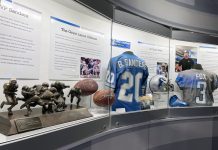
As elite American athletes — but not government dignitaries! — head to China this month for the most controversial Olympics in decades, Birmingham-born and Detroit-raised three-time speedskating Olympic medalist Sheila Young-Ochowicz will watch from her Park City, Utah, home. At 71, she’s a world and nearly a half-century removed from the 1976 Games where, as a speedskater in Innsbruck, Austria, she became the first American athlete to win three medals at a single Winter Olympics.
Her feat — gold in the 500 meter, silver in the 1,500 meter, and bronze in the 1,000 meter — made her a star. A Sports Illustrated cover, a Corn Flakes box, a TV commentating gig, and a seat on the U.S. Olympic host committee for the 1980 Games in Lake Placid followed. In the 1970s, she also won world championships in track cycling, but that was not an Olympic sport for women until long after her retirement or she might be even more heavily decorated. She went on to a career as a middle school teacher in Wisconsin and California.
When we spoke in November, I cradled my occasionally noisy 8-week-old daughter in my lap. Our conversation was wide ranging, but Young-Ochowicz, now a grandmother, offered probably the most unusual parenting advice I’d heard: “I tell everybody who has a daughter that it’s really important for girls to do competitive things with dads. It’s really important to have that competitive relationship with a man. That will make her more successful in whatever she does.”
ĚÇĐÄvlog°˛×ż°ć Detroit: Your brother and your husband competed as Olympic cyclists in the 1970s, and your daughter as a speedskater in three Winter Games. Your parents were also national champion athletes. How did your family become this Olympic dynasty?
Sheila Young-Ochowicz: I don’t exactly know how to answer. It all started in Detroit, Michigan, with parents who were competitive — and not just in sports. They instilled in my brothers and my sister and me that if you work hard, it’ll pay off. I used to tell people, “I’m the best mom. I’m like a gold medal mom.” I had supportive parents who nurtured my innate desire to be the best. It’s not necessarily that you’re going to make an Olympic team but that every time you go out on the starting line, or even to school, that you’re doing the best that you can do.Ěý
Did you all skate together a lot?
Oh, yes. We used to skate on Quarton Lake in
Birmingham. My parents used to get their cars out there and have their headlights on so we could skate, and they’d shovel off the rink for us. My dad thought: The family that plays together stays together.
Did you know then you were training for the Olympics?Ěý
No, no, no, no, no. It was fun, I tell you. I started off on figure skates having a good time. It was a family affair for us, and I wasn’t very good. It was the feel of skating and going fast that really kept me going. I was not very graceful, so I think that the enjoyment that I got out of it was just the pleasure of being able to do something and doing it good.Ěý
What did you get out of living in the Detroit area that propelled your career?
I’ll tell you exactly what. Farwell Field had the only outdoor skating rink in the U.S. at the time. It was a small rink, and then they had a hockey rink. For the competitions, they would open up the hockey rink so they could make the track bigger. If we didn’t have that, I probably never would have done speedskating. We would train there. We would have ice before anybody else [in the country] had natural ice anywhere. That was the key thing. Plus, in the Detroit area, we had several speedskating clubs — it was very competitive. That was the best.
Were the Olympics as big a deal in 1976 as they are now?
Yes. In Europe, I was very famous. But then, in the U.S., maybe not so much. In the U.S., every four years, you would see speedskating. That was about it. But in countries like Holland and Germany and the Scandinavian countries, yeah, by 1976, I had won the world championships and I set world records.
This year, the Winter Olympics are in China. How do you feel about it?
Personally, I would not want to be competing there, although I would not boycott it. What the Chinese government has done and how it treats its people is not the way I would like for it to behave. I’ve tried to stop buying things from China, because I’m just not supportive of that country. But the Olympics, wherever they hold them, cost a lot of money. When I worked on Lake Placid, we worked on a shoestring, and it’s only gotten more expensive. They’ve added more sports; they’ve got more athletes to deal with. If a country like China can put on these games, it’s good for everybody.
How have the Olympics changed?
The technology has changed so much. With streaming, you can watch anything any time,
whatever you want. When I competed in Japan
in 1972, I don’t think my dad got to watch it live. They would just play parts of it on tape or whatever. Now, you can watch every single race live. It’s just unbelievable.Ěý
What does it feel like to win a gold medal?
When I was standing on the podium and they were raising the American flag, if only you knew how good it feels. I can only compare it to having your child. You get like, “Oh my gosh, this is the best thing that happened to me.”Ěý
You were on a Wheaties box.
Corn Flakes!Ěý
Do you still have it?
I do. I think I have two. My husband had one framed, and it is now in my food pantry closet in our lake house in Wisconsin. We had to put it somewhere, and it’s just for fun. That came out in 1980.
Where are your Olympic medals?Ěý
Actually, I brought them to Wisconsin this summer, because my neighbor there wanted to see them. But they’re back here in Utah, in my closet, in their containers. They come in a box or whatever.
Do you ever have any reason to wear them?
No, no. They’re not fragile, but they’ve taken a lot of beating because I used to do more speaking engagements where I would bring the medals and people would touch them. Every gold medal has only so much gold on it, but it’s got a silver core. People have touched it so much, it’s rubbed the gold off in some places. So they’re just tucked away in my closet. I bring them out every once in a while. It really means a lot to some people.Ěý
And the Sports Illustrated cover? You have that framed somewhere?
Um, I’m not sure. If I do, I don’t know where it is.Ěý
What was it like after all of that hullabaloo passed? Was it hard for you to adjust to not being so prominent?
No, but I did miss competing. I remember Caitlyn Jenner — then Bruce Jenner — saying after she won her medal that she was so happy she never had to run another step. I’m thinking, “Whoa, that’s really sad, because I love skating.” I still love cruising around the rink.Ěý
How different was it being at the Olympics when your daughter competed?
It was really hard. I knew exactly how she felt in every race. I was feeling every stroke with her. It’s hard watching because you can’t do anything. It’s up to them.Ěý
Did your middle school students understand that their teacher was on a Corn Flakes box?
No, no, no. I never made a big deal of it. The year I stopped teaching, I did show my seventh grade class a video from ABC, like a montage of my skating and my three Olympic medals. They’d had me all year and never realized I’d done this. I’m standing in the back of the room, and they’re all looking at the screen and then looking back at me and they’re like, “Whoa, is this the same person?” I don’t look at all like I did then. I have blonde hair now, because of my gray, and then, I had dark, long hair, and I didn’t have all the wrinkles.
This story is featured in the February 2022 issue of ĚÇĐÄvlog°˛×ż°ć. Read more stories in ourĚýdigital edition.
|
| Ěý |
|








